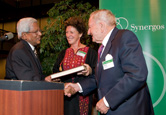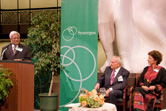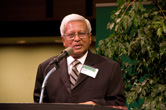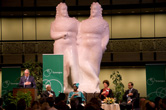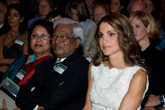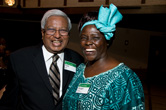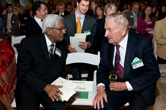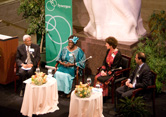
News (826)
BRAC Officials meet with Foreign Adviser to discuss Afghanistan Kidnapping
26 October 2008, Dhaka. BRAC Executive Director of Overseas Programmes, Md. Aminul Alam, and Director, Public Affairs & Communications, M. Anwarul Haq attended a meeting on Sunday afternoon with the Foreign Affairs Adviser to the Government of Bangladesh, Iftekhar Ahmed Chowdhury, and the Afghan Ambassador to Bangladesh, Ahmad Karim Nawabi, to discuss the abduction last Thursday of the two BRAC Afghanistan area managers in Ghazni, Afghanistan. The BRAC senior officials urged the Bangladeshi government to extend all possible collaboration in their efforts to secure the release of the kidnapped staff members. The Foreign Affairs Adviser assured that all cooperation will be extended by the Foreign Ministry and also made an appeal to the Afghanistan government, through the Ambassador, to extend its support.
Speaking to the media following the meeting, Md. Aminul Alam said that while BRAC’s activities would continue in Afghanistan, the organisation will work to build the capacity of its Afghan staff members so that it can withdraw all Bangladeshi employees within five years.
Earlier, senior BRAC Afghanistan officials, including the country programme coordinator Md. Fazlul Hoque, met with the Afghan Minister of Interior, Hanif Atmar, Saturday evening to discuss the matter. Mr. Atmar assured the BRAC officials that he has been taking all necessary action to rescue the abductees. During the meeting, he requested Afghan security and intelligence authorities to look into the matter.
Meanwhile, BRAC officials in Bangladesh continue to be in constant communication with the families of Akhter and Shahjahan. Md. Aminul Alam met with the wives and other family members of Akhter Ali and Mohammad Shahjahan Ali at the BRAC head office in Mohakhali on Sunday afternoon.
BRAC Officials meet with Foreign Adviser to discuss Afghanistan Kidnapping
26 October 2008, Dhaka. BRAC Executive Director of Overseas Programmes, Md. Aminul Alam, and Director, Public Affairs & Communications, M. Anwarul Haq attended a meeting on Sunday afternoon with the Foreign Affairs Adviser to the Government of Bangladesh, Iftekhar Ahmed Chowdhury, and the Afghan Ambassador to Bangladesh, Ahmad Karim Nawabi, to discuss the abduction last Thursday of the two BRAC Afghanistan area managers in Ghazni, Afghanistan. The BRAC senior officials urged the Bangladeshi government to extend all possible collaboration in their efforts to secure the release of the kidnapped staff members. The Foreign Affairs Adviser assured that all cooperation will be extended by the Foreign Ministry and also made an appeal to the Afghanistan government, through the Ambassador, to extend its support.
Speaking to the media following the meeting, Md. Aminul Alam said that while BRAC’s activities would continue in Afghanistan, the organisation will work to build the capacity of its Afghan staff members so that it can withdraw all Bangladeshi employees within five years.
Earlier, senior BRAC Afghanistan officials, including the country programme coordinator Md. Fazlul Hoque, met with the Afghan Minister of Interior, Hanif Atmar, Saturday evening to discuss the matter. Mr. Atmar assured the BRAC officials that he has been taking all necessary action to rescue the abductees. During the meeting, he requested Afghan security and intelligence authorities to look into the matter.
Meanwhile, BRAC officials in Bangladesh continue to be in constant communication with the families of Akhter and Shahjahan. Md. Aminul Alam met with the wives and other family members of Akhter Ali and Mohammad Shahjahan Ali at the BRAC head office in Mohakhali on Sunday afternoon.
Two BRAC Staff Abducted in Afghanistan
25 October 2008, Dhaka. Two BRAC staff members, Akhter Ali and Mohammad Shahjahan Ali, were kidnapped last Thursday, 23 October, from the Ghazni province of Afghanistan, where they have both been working as BRAC Afghanistan Area Managers for the last three years. The BRAC Afghanistan authorities in Kabul have confirmed the following details of the incident: Akhter and Shahjahan were abducted at gunpoint by four men from BRAC Afghanistan’s Moi Mobarok branch office in the provincial capital, Ghazni City, where they had travelled as part of their regular office visit schedule. During the attack, the manager of the branch office, Hasmatullah, an Afghani national, was also severely beaten. The identities of the attackers are yet to be confirmed.
In immediate response, BRAC Afghanistan authorities contacted the Afghani Minister of Interior, Hanif Atmar, Thursday night to inform him of the incident. Mr. Atmar assured BRAC that the Afghan authorities would provide all necessary support in rescuing the two BRAC staff members. He also communicated with his Advisor of Security and conveyed a message to the Ghazni police. BRAC Afghanistan authorities also informed the United Nations Assistance Mission in Afghanistan and the Afghan Ministry of Rural Rehabilitation and Development of the incident and are now in continuous communication with the Afghan authorities regarding the matter.
A high level team has been sent to Ghazni from the BRAC Afghanistan head office in Kabul to gather information and to liaise with the Afghani authorities, including the Governor and Chief Security Officer of Ghazni. Senior BRAC Afghanistan officials will also meet with the Afghan Minister of Rural Rehabilitation and Development, Ehsan Zia, on Sunday.
BRAC officials in Bangladesh have been in communication with the families of Akhter and Shahjahan, keeping them informed of the latest situation and providing all necessary support.
Ghazni is one of thirty-four provinces of Afghanistan, with its capital in Ghazni City. The province lies in the eastern part of the country, south-west of Kabul. BRAC Afghanistan has been working in Ghazni for the last three years. Telephone networks in Ghazni have been inoperative for the last four days, making communication extremely difficult.
Two BRAC Staff Abducted in Afghanistan
25 October 2008, Dhaka. Two BRAC staff members, Akhter Ali and Mohammad Shahjahan Ali, were kidnapped last Thursday, 23 October, from the Ghazni province of Afghanistan, where they have both been working as BRAC Afghanistan Area Managers for the last three years. The BRAC Afghanistan authorities in Kabul have confirmed the following details of the incident: Akhter and Shahjahan were abducted at gunpoint by four men from BRAC Afghanistan’s Moi Mobarok branch office in the provincial capital, Ghazni City, where they had travelled as part of their regular office visit schedule. During the attack, the manager of the branch office, Hasmatullah, an Afghani national, was also severely beaten. The identities of the attackers are yet to be confirmed.
In immediate response, BRAC Afghanistan authorities contacted the Afghani Minister of Interior, Hanif Atmar, Thursday night to inform him of the incident. Mr. Atmar assured BRAC that the Afghan authorities would provide all necessary support in rescuing the two BRAC staff members. He also communicated with his Advisor of Security and conveyed a message to the Ghazni police. BRAC Afghanistan authorities also informed the United Nations Assistance Mission in Afghanistan and the Afghan Ministry of Rural Rehabilitation and Development of the incident and are now in continuous communication with the Afghan authorities regarding the matter.
A high level team has been sent to Ghazni from the BRAC Afghanistan head office in Kabul to gather information and to liaise with the Afghani authorities, including the Governor and Chief Security Officer of Ghazni. Senior BRAC Afghanistan officials will also meet with the Afghan Minister of Rural Rehabilitation and Development, Ehsan Zia, on Sunday.
BRAC officials in Bangladesh have been in communication with the families of Akhter and Shahjahan, keeping them informed of the latest situation and providing all necessary support.
Ghazni is one of thirty-four provinces of Afghanistan, with its capital in Ghazni City. The province lies in the eastern part of the country, south-west of Kabul. BRAC Afghanistan has been working in Ghazni for the last three years. Telephone networks in Ghazni have been inoperative for the last four days, making communication extremely difficult.
A change of hearth
25 September 2008, Dhaka. Politicians of Bangladesh who have used the state apparatus to further the interests of their own and those of their cronies keep making news because of their corrupt deeds.
Over the past 35 years, a section of the country’s urban middle class has also amassed wealth through dishonest means.
Even as several corrupt politicians are either brought to justice or forced to be on the run, the country is in search of the right leader and the right formula for the future.
The fate of more than 80 per cent of Bangladesh’s 145 million people — deprived of proper education, sanitation and healthcare facilities and other basic needs — is also gradually changing for the better.
Over the years, the rural poor have remained left out of any plan for development.
They were, in fact, left to the mercy of God and a handful of non-government organisations.
One of these, the Bangladesh Rural Advancement Committee (BRAC), which is the world’s largest in terms of reach, has been training Bangladesh’s rural poor on education, sanitation, nutrition and healthcare since its inception in 1972, right after the independence of Bangladesh.
Focus on back of beyond
BRAC is now focusing on how to save the rural poor from the recent food crisis, at a time when the global economy is trying to come to terms with high oil prices and shortage of food.
“Just grow more food per hectare and use better quality seeds that will ensure better yield," Fazle Hasan Abed, a Bangladeshi social entrepreneur and BRAC’s founder and chairperson, told Weekend Review in an interview recently.
“Increased productivity in the agricultural sector with better quality seeds could help most agriculture dependent economies to become self-sufficient in food.”
While some economists struggle to assess the magnitude of the situation and find out what went wrong with capitalism, Abed is helping his compatriots cope with the crisis.
“Chinese farmers produce eight tonnes of rice per hectare while we grow only five in Bangladesh.
"If we can match the Chinese efficiency, countries such as Bangladesh will be able to meet the growing food demand and be able to store for the future,” he says.
Forbes recently ran a feature on Abed, saying he should have been considered for the Nobel prize. Many in Bangladesh share this view. The belief gained strength after Mohammad Yunus won the Nobel prize in 2006.
Born in 1936 in Bangladesh, Abed is the son of a rich landowner. He was educated in the Dhaka and Glasgow universities.
The 1971 Liberation War of Bangladesh had a profound effect on Abed, then a professional accountant in his thirties holding a senior corporate executive’s position at Shell Oil in Chittagong.
The war changed the direction of his life. In the face of the brutality and agony of war, the comforts and perks of a corporate executive’s life ceased to have any attraction for Abed.
As the then East Pakistan was under virtual occupation, Abed left his job and went to London to devote himself to the Liberation War of Bangladesh.
There Abed helped initiate a campaign called Help Bangladesh to organise funds for the war effort and raise awareness in the world about the genocide in his homeland.
Abed launched BRAC in 1972 to help rebuild a nation ravaged by a nine-month war that claimed 3 million lives and displaced 10 million.
He sold his property in the United Kingdom for $17,000 and invested the money in BRAC, leading him on a difficult journey that eventually succeeded.
Since then, his organisation has engaged itself in a silent revolution by providing rural healthcare, education and income-generating schemes to millions of poor people in a country where the birthrate averaged seven children per mother.
Poverty eradication
“Poverty eradication helps people access knowledge and credit and empowers them to become consumers," Abed says.
“We will disburse more than $1.2 billion in microfinance this year to more than 7.4 million borrowers in Bangladesh.
"We have brought 120 million people within our reach during the past 35 years, including 110 million in Bangladesh.
"This makes BRAC the world’s largest NGO in terms of reach. We are not the richest but the largest. We are also the only southern NGO that has gone global.”
BRAC has a presence in Pakistan, Afghanistan, Tanzania, Sudan, Liberia and Sierra Leone.
It has a network of 33 offices in Pakistan with 1 million borrowers. BRAC has a strong social development network across 23 of Afghanistan’s 34 provinces.
Population explosion had at one stage become the biggest threat to Bangladesh’s economic growth.
In 1977, the Bangladesh government identified population growth as a national problem, gradually helping to bring down the growth rate to 1.7 per cent.
Through BRAC and other NGOs, the Bangladesh government and large international donors have made cheap contraceptives available to millions of couples and educated them to use these products, breaking a social taboo.
Use of contraceptives and prevention of childbirth was considered an act against God’s will in parts of Bangladesh, which fuelled the high birthrate.
“We have managed to bring down the birthrate per mother to 2.7 from 7 in the 1970s,” Abed says.
In 1979, about 135 infants out of 1,000 in the country died before their first birthday and 250 before reaching 5.
Cuting down mortality
“Over the past 35 years, we have been able to help cut down mortality among infants and children. This has come down to 65 per thousand, which we are trying to reduce further,” he says.
“Survival of children cuts the propensity of a mother’s desire to have more children. As the child mortality rate was high, couples used to have more children, so that [at least] a few would survive.”
BRAC has brought more than 80 million Bangladeshis under its healthcare programme. “Bangladesh has been the most successful in this area. No other country has managed to achieve this so fast.”
If population is topmost on the list of Bangladesh’s priorities, then education and empowerment of people should come second.
However, both these tasks have proved to be huge challenges. BRAC has a network of 52,000 informal schools through which it provides basic education to more than 1.5 million students.
Bangladesh has 19 million students between the ages of 6 and 10. About 15 million study in 17,000 government schools while 2.5 million do not go to school.
“In the 1970s, the dropout rate in primary schools was 60 per cent, with a very low enrolment. Today Bangladesh has 85 per cent primary enrolment in which there is still a 30 per cent dropout,” Abed says.
“At least 55 per cent complete primary schooling, although the quality of teaching and learning remains an issue. We are now trying to improve this.”
BRAC has undertaken a programme to improve the quality of education in public schools by providing training to teachers. But this initiative has come under severe attack.
Hopes for a better life
BRAC has a borrower base of 7.4 million people who are trying to improve their lot with the help of microcredit. It has a recovery rate of 98 per cent — the same as Grameen Bank — another microcredit pioneer set up by Nobel prizewinner Mohammad Yunus.
“Many of them [borrowers] have already changed their livelihood and improved their lives.
'While more than two thirds of our borrowers have achieved significant improvement, several have also dropped out of the microcredit programmes as they could not make any headway,” Abed says.
The success of microcredit and microfinance schemes has successfully pulled millions of Bangladeshis out of absolute poverty.
In the 1970s more than 66 per cent Bangladeshis used to live below the poverty line or absolute poverty, earning less than $2 per month.
“This has come down to below 40 per cent because of income-generating schemes and microfinance projects run by NGOs,” he added. “We provide $200 million to the poor to come out of absolute poverty every year.”
BRAC has already established a footprint in southern Sudan as part of its plan to expand in ten countries in Africa.
“We are already present in five African countries and we plan to enter ten,” Abed said. “We want to make a difference in the lives of the people of these countries in terms of healthcare, education and anti-poverty programmes.”
By Saifur Rahman, Business Editor, Gulf News
BRAC AWARDED $1.5 MILLION HILTON HUMANITARIAN PRIZE
27 September 2008, Los Angeles. BRAC, the largest non-profit organisation in the developing world, has been selected to receive the 2008 Conrad N. Hilton Humanitarian Prize of $1.5 million. The Conrad N. Hilton Foundation presents the annual award, the world’s largest humanitarian prize, to an organisation that is significantly alleviating human suffering. The prize will be presented on October 20 in Geneva, Switzerland.
‘BRAC’s approach to creating self-sufficient and sustainable programmes on a massive scale has blazed a trail for development organisations around the world,’ said Steven M. Hilton, President and CEO of the Hilton Foundation. ‘Where most NGOs might tackle one dimension of poverty, BRAC delivers multi-faceted solutions to attack all aspects simultaneously,’ Hilton added.
Launched in Bangladesh in 1972, BRAC reaches more than 110 million people with its holistic approach to addressing poverty by providing access to credit for economic development and delivering health services, education, social awareness of legal and human rights and business management and skills training. Now in its 37th year, BRAC has taken its model beyond Bangladesh into eight other Asian and African countries. It has issued $5 billion in micro-loans to nearly seven million borrowers; graduated 3.8 million students from its primary schools and 2.3 million from its pre-primary schools, with 1.5 million children currently enrolled in its 52,000 schools; provided basic health services to more than 90 million; created 8.5 million jobs; and employed 110,000 staff and teachers.
According to Fazle Hasan Abed, BRAC’s founder and chairperson, ‘To receive the Hilton Prize is a great honour and tremendous validation of our work. Billions of people in the world today live in extreme poverty, and it is our goal to transition the poor from receiving aid to controlling their own destinies. The Hilton Prize will add to our momentum as we take on greater challenges to unleash the full potential of the poor, especially women, and to realise justice and their full human rights.’
Judy Miller, vice president of the Hilton Foundation and director of the Hilton Prize, said BRAC was one of more than 225 nominees for the 2008 Hilton Prize. She added that the Hilton Prize international jurors were impressed by BRAC’s innovation and the diversity of its programmes, along with its ability to dramatically scale up its work and to expand beyond Bangladesh into other developing countries.
Miller added, ‘BRAC began by targeting poor rural women and recently announced a major initiative to educate girls in Africa and Asia. This is the third year in a row that our Hilton Prize recipient is an NGO that recognises women as the critical agents of change to lift their families and communities from poverty.’
About BRAC
Formerly known as the Bangladesh Rural Advancement Committee, BRAC was founded in 1972 by former Shell Oil executive Fazle Hasan Abed, with proceeds from the sale of his London apartment, to help Bangladesh overcome the devastation and trauma of the liberation war that secured its independence from Pakistan. Using micro-finance as its core component, BRAC sets up small village organisations run by 30 to 40 women that provide their communities access to credit for economic development and also deliver health services, education, social awareness of legal and human rights and business management and skills training. Today, BRAC’s programmes reach three quarters of Bangladesh’s population through the efforts of more than 110,000 micro-finance officers, teachers, health staff and enterprise managers. BRAC has helped bring Bangladesh’s immunisation rate from 2 percent to 83 percent and reached 86 million people with its tuberculosis control program. The organisation has been instrumental in lowering Bangladesh’s maternal and infant mortality rates. At a time when half of children’s deaths were caused by diarrhea, BRAC sent women into the countryside to teach 13 million mothers how to prepare an oral rehydration solution.
In recent years, BRAC has expanded its programmes globally. In 2002, the organisation moved into post-Taliban Afghanistan after seeing the haunting images of three million refugees returning to the war-torn country. Starting out with $250,000 of its own funding, BRAC is now the largest micro-finance, health and education provider in the country, operating in 25 of Afghanistan’s 34 provinces and disbursing over $96 million in small loans. The organisation began working in Sri Lanka in 2004 after the devastating tsunami and has set up 40 offices throughout Pakistan. Over the last two years, BRAC launched programmes in Tanzania, Uganda, Liberia and Southern Sudan in response to reports that Africa is the only continent where the proportion of poor is growing. BRAC plans to operate in 10 African countries by 2010.
About the Hilton Prize
The Hilton Prize is presented each year in conjunction with the annual Hilton Humanitarian Symposium which gathers policymakers and world leaders in the humanitarian field to address critical challenges. This year’s theme is: “The Bottom Billion—Is There a Tipping Point?”
This year’s Hilton Prize jury includes: Princess Salimah Aga Khan, International Ambassador for SOS-Kinderdorf International; Catherine Bertini, former Executive Director of the United Nations World Food Programme and Senior Fellow in Agricultural Development at the Bill and Melinda Gates Foundation; Gro Harlem Brundtland, M.P.H., former Director General, World Health Organisation and former Prime Minister of Norway; Gregory R. Dillon, Director, Conrad N. Hilton Foundation; Eric M. Hilton, Director, Conrad N. Hilton Foundation and son of Conrad Hilton; Olara A. Otunnu, former UN Under-Secretary-General and Special Representative for Children and Armed Conflict and former Ugandan Minister for Foreign Affairs; and Professor Amartya Sen, Nobel Prize Laureate in Economics and Lamont University Professor at Harvard University.
Former Hilton Prize recipients are recognised leaders in the humanitarian world and include: Tostan (Senegal) 2007; Women for Women International (Washington, DC) 2006; Partners in Health (Massachusetts) 2005; Heifer International (Arkansas) 2004; International Rehabilitation Center for Torture Victims (Denmark) 2003; SOS Children’s Villages (Austria) 2002; St. Christopher’s Hospice (England) 2001; Casa Alianza (Costa Rica) 2000; African Medical and Research Foundation (Kenya) 1999; Doctors Without Borders (France) 1998; International Rescue Committee (New York) 1997; and Operation Smile (Virginia) 1996.
About the Hilton Foundation
Based in Los Angeles, the Hilton Foundation was created in 1944 by the late hotel entrepreneur and business leader, Conrad N. Hilton, who left his fortune to the foundation when he died in 1979 with instructions to help the most disadvantaged and vulnerable throughout the world without regard to religion, ethnicity or geography. Barron Hilton, who also led Hilton Hotels Corporation and is current chairman of the foundation, has joined his father in committing to leave the bulk of his wealth to the foundation. The foundation along with its related entities has assets exceeding $4.2 billion and, since its inception, has committed more than $780 million for charitable projects throughout the world.
A change of hearth
25 September 2008, Dhaka. Politicians of Bangladesh who have used the state apparatus to further the interests of their own and those of their cronies keep making news because of their corrupt deeds.
Over the past 35 years, a section of the country’s urban middle class has also amassed wealth through dishonest means.
Even as several corrupt politicians are either brought to justice or forced to be on the run, the country is in search of the right leader and the right formula for the future.
The fate of more than 80 per cent of Bangladesh’s 145 million people — deprived of proper education, sanitation and healthcare facilities and other basic needs — is also gradually changing for the better.
Over the years, the rural poor have remained left out of any plan for development.
They were, in fact, left to the mercy of God and a handful of non-government organisations.
One of these, the Bangladesh Rural Advancement Committee (BRAC), which is the world’s largest in terms of reach, has been training Bangladesh’s rural poor on education, sanitation, nutrition and healthcare since its inception in 1972, right after the independence of Bangladesh.
Focus on back of beyond
BRAC is now focusing on how to save the rural poor from the recent food crisis, at a time when the global economy is trying to come to terms with high oil prices and shortage of food.
“Just grow more food per hectare and use better quality seeds that will ensure better yield," Fazle Hasan Abed, a Bangladeshi social entrepreneur and BRAC’s founder and chairperson, told Weekend Review in an interview recently.
“Increased productivity in the agricultural sector with better quality seeds could help most agriculture dependent economies to become self-sufficient in food.”
While some economists struggle to assess the magnitude of the situation and find out what went wrong with capitalism, Abed is helping his compatriots cope with the crisis.
“Chinese farmers produce eight tonnes of rice per hectare while we grow only five in Bangladesh.
"If we can match the Chinese efficiency, countries such as Bangladesh will be able to meet the growing food demand and be able to store for the future,” he says.
Forbes recently ran a feature on Abed, saying he should have been considered for the Nobel prize. Many in Bangladesh share this view. The belief gained strength after Mohammad Yunus won the Nobel prize in 2006.
Born in 1936 in Bangladesh, Abed is the son of a rich landowner. He was educated in the Dhaka and Glasgow universities.
The 1971 Liberation War of Bangladesh had a profound effect on Abed, then a professional accountant in his thirties holding a senior corporate executive’s position at Shell Oil in Chittagong.
The war changed the direction of his life. In the face of the brutality and agony of war, the comforts and perks of a corporate executive’s life ceased to have any attraction for Abed.
As the then East Pakistan was under virtual occupation, Abed left his job and went to London to devote himself to the Liberation War of Bangladesh.
There Abed helped initiate a campaign called Help Bangladesh to organise funds for the war effort and raise awareness in the world about the genocide in his homeland.
Abed launched BRAC in 1972 to help rebuild a nation ravaged by a nine-month war that claimed 3 million lives and displaced 10 million.
He sold his property in the United Kingdom for $17,000 and invested the money in BRAC, leading him on a difficult journey that eventually succeeded.
Since then, his organisation has engaged itself in a silent revolution by providing rural healthcare, education and income-generating schemes to millions of poor people in a country where the birthrate averaged seven children per mother.
Poverty eradication
“Poverty eradication helps people access knowledge and credit and empowers them to become consumers," Abed says.
“We will disburse more than $1.2 billion in microfinance this year to more than 7.4 million borrowers in Bangladesh.
"We have brought 120 million people within our reach during the past 35 years, including 110 million in Bangladesh.
"This makes BRAC the world’s largest NGO in terms of reach. We are not the richest but the largest. We are also the only southern NGO that has gone global.”
BRAC has a presence in Pakistan, Afghanistan, Tanzania, Sudan, Liberia and Sierra Leone.
It has a network of 33 offices in Pakistan with 1 million borrowers. BRAC has a strong social development network across 23 of Afghanistan’s 34 provinces.
Population explosion had at one stage become the biggest threat to Bangladesh’s economic growth.
In 1977, the Bangladesh government identified population growth as a national problem, gradually helping to bring down the growth rate to 1.7 per cent.
Through BRAC and other NGOs, the Bangladesh government and large international donors have made cheap contraceptives available to millions of couples and educated them to use these products, breaking a social taboo.
Use of contraceptives and prevention of childbirth was considered an act against God’s will in parts of Bangladesh, which fuelled the high birthrate.
“We have managed to bring down the birthrate per mother to 2.7 from 7 in the 1970s,” Abed says.
In 1979, about 135 infants out of 1,000 in the country died before their first birthday and 250 before reaching 5.
Cuting down mortality
“Over the past 35 years, we have been able to help cut down mortality among infants and children. This has come down to 65 per thousand, which we are trying to reduce further,” he says.
“Survival of children cuts the propensity of a mother’s desire to have more children. As the child mortality rate was high, couples used to have more children, so that [at least] a few would survive.”
BRAC has brought more than 80 million Bangladeshis under its healthcare programme. “Bangladesh has been the most successful in this area. No other country has managed to achieve this so fast.”
If population is topmost on the list of Bangladesh’s priorities, then education and empowerment of people should come second.
However, both these tasks have proved to be huge challenges. BRAC has a network of 52,000 informal schools through which it provides basic education to more than 1.5 million students.
Bangladesh has 19 million students between the ages of 6 and 10. About 15 million study in 17,000 government schools while 2.5 million do not go to school.
“In the 1970s, the dropout rate in primary schools was 60 per cent, with a very low enrolment. Today Bangladesh has 85 per cent primary enrolment in which there is still a 30 per cent dropout,” Abed says.
“At least 55 per cent complete primary schooling, although the quality of teaching and learning remains an issue. We are now trying to improve this.”
BRAC has undertaken a programme to improve the quality of education in public schools by providing training to teachers. But this initiative has come under severe attack.
Hopes for a better life
BRAC has a borrower base of 7.4 million people who are trying to improve their lot with the help of microcredit. It has a recovery rate of 98 per cent — the same as Grameen Bank — another microcredit pioneer set up by Nobel prizewinner Mohammad Yunus.
“Many of them [borrowers] have already changed their livelihood and improved their lives.
'While more than two thirds of our borrowers have achieved significant improvement, several have also dropped out of the microcredit programmes as they could not make any headway,” Abed says.
The success of microcredit and microfinance schemes has successfully pulled millions of Bangladeshis out of absolute poverty.
In the 1970s more than 66 per cent Bangladeshis used to live below the poverty line or absolute poverty, earning less than $2 per month.
“This has come down to below 40 per cent because of income-generating schemes and microfinance projects run by NGOs,” he added. “We provide $200 million to the poor to come out of absolute poverty every year.”
BRAC has already established a footprint in southern Sudan as part of its plan to expand in ten countries in Africa.
“We are already present in five African countries and we plan to enter ten,” Abed said. “We want to make a difference in the lives of the people of these countries in terms of healthcare, education and anti-poverty programmes.”
By Saifur Rahman, Business Editor, Gulf News
BRAC Founder Fazle Abed receives Rockefeller Leadership Award
BRAC Founder Fazle Abed receives Rockefeller Leadership Award
25 September 2008, Dhaka – Celebrated American banker, statesman and philanthropist and current patriarch of the Rockefeller family, David Rockefeller Sr. presented the 2008 David Rockefeller Bridging Leadership Award to BRAC Founder and Chairperson Fazle Hasan Abed Tuesday evening in New York City, honoring his innovative work to empower the poor. The award was also presented to Queen Rania Al Abdullah of Jordan.
The award was presented at an event titled University for a Night, which is a unique annual gathering of leaders from business, government, civil society and philanthropy, organised by the Synergos Institute. Prior to receiving the prize, Mr. Abed took part in a plenary discussion with Nobel Peace Laureate Wangari Maathai. From Wednesday to Friday, Mr. Abed will also be participating in the Clinton Global Initiative, an annual meeting hosted by former US President Bill Clinton.
All photos courtesy of Christine A Butler/Synergos
We are deeply saddened by the passing of Dr. Allan Rosenfield
24 September 2008, Dhaka. We are deeply saddened by the passing of Dr. Allan Rosenfield, Chair of BRAC USA and the former dean of the Mailman School of Public Health at Columbia University. Dr. Rosenfield had been suffering for the past three years from diseases which affected his motor nerve functions. He was an icon in the world of public health, one of the most outspoken advocates for women’s health rights and an ardent supporter of BRAC. We are grateful for his unbending dedication to BRAC over the years and particularly to the amount of time and energy he gave to launching BRAC USA, in spite of his deteriorating health.
Dr. Lincoln Chen, BRAC USA board member and friend of Dr. Rosenfield, has paid the following tribute: “While none of us are immortal, and Allan's illness was clearly exacting a toll, he fought and braved the burden with enormous courage. I was amazed at how he kept pushing those of us around him to stay in touch, to keep interacting, to not let his illness slow us down. Indeed, he became even more invigorated while fighting his illness!
All of us owe a huge debt to Allan, for launching BRAC USA and so many other global health endeavors -- from his earliest innovative work in Thailand to his leadership at the Population Council, Columbia University, and in so many international health activities. To the end, Allan remained steadfast in his commitments, never bending to the enormous political pressures on him and his institution to compromise on women's health, human rights, and equity in global health.”
Our thoughts and prayers are with the Rosenfield family.
Join the world’s biggest family

